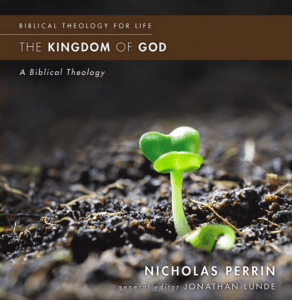 The one expression in the New Testament Christians should be able to define, but which they seemingly can’t, is “kingdom,” whether as Kingdom of God or Kingdom of Heaven/s. Why should they be able to define it? Because is the central image of Jesus, who is Lord for every Christian. Many can define justification or atonement theories with the best of them, but few can define “kingdom.”
The one expression in the New Testament Christians should be able to define, but which they seemingly can’t, is “kingdom,” whether as Kingdom of God or Kingdom of Heaven/s. Why should they be able to define it? Because is the central image of Jesus, who is Lord for every Christian. Many can define justification or atonement theories with the best of them, but few can define “kingdom.”
Nicholas Perrin can. He has done so in his new book The Kingdom of God: A Biblical Theology. Today’s post is both an encouragement for you or your library to obtain this book as well as a sketch of the big picture we will find in Perrin.
In exploring the kingdom of God, we could do worse than ask the well-known journalistic questions: the five Ws and the one H. They are as follows: 1. What is the kingdom? What is its essence and its formal features? What’s the best way to describe it? 2. Who is involved in initiating the kingdom? To whom does the kingdom belong? 3. When did the kingdom arrive? Or if it’s not already here, when will it arrive? 4. Where does the kingdom extend? In what spaces or spheres of reality? 5. Why do we have a kingdom? Why would God be so interested in establishing this kingdom, and why would Jesus be so interested to talk about it? 6. How does the kingdom function? How does one live in the kingdom today?
Next Perrin sketches two big views, what might be called the Imminent View (Weiss, Schweitzer) and the Immanent View (Ritschl, Harnack), the apocalyptic and the social activism views.
On one side are those who, like Weiss and Schweitzer, see the kingdom as largely, if not entirely, a future reality. For these interpreters, the coming of the kingdom coincides with the eschatological judgment of God with or without the collapse of the physical universe. Admission to this kingdom is highly selective. As Weiss and Schweitzer’s Jesus looked ahead to the impending eschatological crisis (which according to Schweitzer, he attempted to prompt), he saw dire scenarios of tribulation, though the righteous would finally emerge. Whether Jesus’s apocalyptic predictions were accurate or not. . . well, not so much.
On the other side are those who, like Ritschl and Harnack, embrace a moral-persuasion theory of atonement (suggesting that we obtain forgiveness only after being nudged by Jesus’s good example) and sit loose on Jesus’s divinity. For these thinkers and religionists, the kingdom is not an event but an ongoing reality, accessible to all who are willing to follow Jesus’s lead in life. On this view, the kingdom is not something that God “does” through violent irruption, but something we “do.”
There’s no waiting in this book for a dramatic conclusion or the building of a case; he tells us up front how he will answer the questions above:
Against these options, I will argue that the kingdom of God is a liturgical reality rooted in creation, given expression in human history through the successive covenants, and decisively actualized through John the Baptizer and then Jesus.
I’m fascinated by that term “liturgical.”
Against how so many view kingdom, Perrin poses some denials that he then nuances away from a flat-out denial:
The kingdom is not a social order (though a new social order is a sign of the kingdom’s arrival); nor is it a fellowship of those who experience God in a certain way (though a new experience of God also indicates the kingdom’s arrival); nor is the kingdom a community of those expecting the imminent end of time-space reality (though, again, an eschatologically expectant community is a presenting symptom of a kingdom that has come).
Against those who center the kingdom in those themes, he centers it — as he should — in Jesus.
Instead, the kingdom belongs to those who by faith identify themselves with the person and cause of Jesus—no matter the cost. Everything rises and falls on Jesus Christ and our response to him as he has been revealed.
When? He gives us the very common and right theory of inaugurated eschatology.
In other words, I believe that Jesus asserted both the future coming of the kingdom and its immediate presence in and through himself, through a present ministry of signs, as well as through his death, resurrection, and ascension.
This one is big and not enough have given territory to its proper emphasis, what I categorize in Kingdom Conspiracy as “land.” Perrin puts it this way:
On this note, I disagree with scholars who say that the kingdom involves God’s dynamic rule but has nothing to do with space. In my view, this understanding has more to do with vestiges of creeping Platonism than with anything remotely related to how ancient Jews thought about the kingdom. The kingdom certainly had boundaries and inhabited a certain space.










